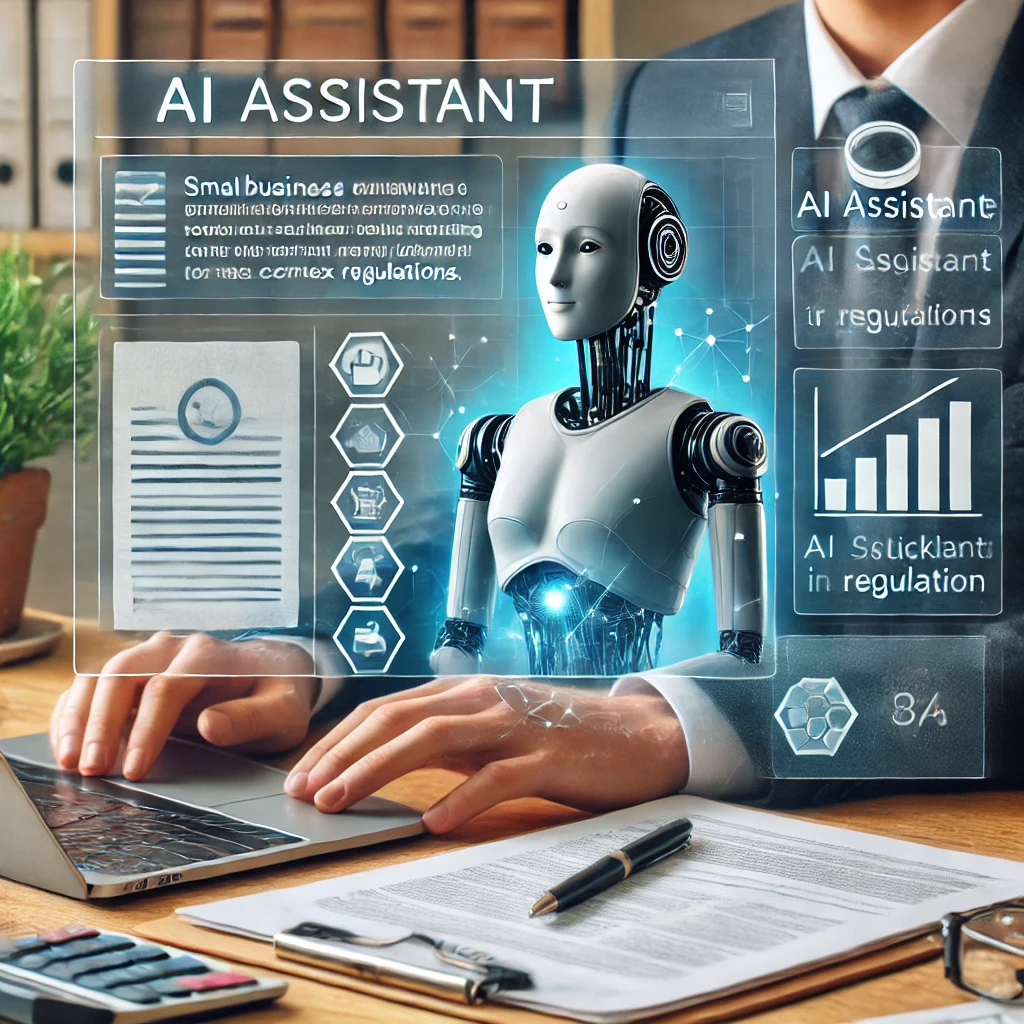How Small Businesses Can Benefit from AI-Driven Regulatory Assistance
Keeping up with changing regulations is something many small business owners struggle with. There’s always a new rule, a new requirement, or some legal update that feels impossible to track. Without a legal team or dedicated compliance expert, it can quickly become overwhelming. And let’s be honest—most people didn’t start a business just to get buried in legal jargon.
But ignoring compliance? That’s not an option either. Fines, lawsuits, and reputational damage can hit harder than expected. The key is to stay ahead, not just to avoid penalties but to build trust and keep operations running smoothly without constant stress.
This article explores how AI-driven regulatory solutions support small businesses, the key benefits they offer, and the industries that can gain the most from AI-powered compliance tools.
Understanding AI-Driven Regulatory Assistance
With the rise of artificial intelligence (AI), businesses now have access to tools that simplify compliance processes. AI-driven regulatory assistance by grand.io helps small enterprises monitor legal changes, automate documentation, and reduce compliance risks. This allows businesses to stay compliant without dedicating excessive time or resources to manual regulatory tasks.
AI-driven regulatory assistance refers to the use of artificial intelligence to analyze, interpret, and automate compliance-related processes. By leveraging machine learning, natural language processing (NLP), and data analytics, AI tools help businesses navigate complex regulations efficiently.
These solutions scan vast amounts of regulatory data, extract relevant legal requirements, and integrate them into business operations. AI-powered compliance tools can assist with tasks such as:
- Regulatory monitoring – Tracking changes in laws, policies, and industry regulations.
- Risk assessment – Identifying potential compliance risks and suggesting preventive actions.
- Document automation – Generating and reviewing legal documents, contracts, and reports.
- Real-time alerts – Notifying businesses about deadlines, legal updates, and non-compliance risks.
- Data security management – Ensuring compliance with data protection laws and privacy policies.
By automating these tasks, AI-driven regulatory assistance reduces the burden on business owners, helping them focus on operations and growth rather than legal complexities.
Key Benefits of AI-Driven Compliance Solutions for Small Businesses
Running a small business is already a challenge, and keeping up with legal and regulatory requirements can make it even more overwhelming. Many small businesses don’t have the budget to hire full-time legal experts, and manual compliance processes can be time-consuming, expensive, and prone to mistakes.
Fortunately, AI-powered regulatory tools are changing the game by making compliance more affordable, accurate, and efficient. Here’s how:
Cutting Down Compliance Costs
For small businesses with tight budgets, hiring legal teams or regulatory experts isn’t always an option. AI-driven compliance tools offer a cost-effective alternative by automating many of these tasks. Instead of manually tracking policy updates or consulting expensive legal advisors, businesses can rely on AI to stay compliant while cutting down costs.
Minimizing Human Errors and Risks
Handling compliance manually leaves room for mistakes—missed deadlines misinterpreted regulations, or outdated policies. Unfortunately, even small errors can result in heavy fines or reputational damage. AI-powered solutions analyze legal requirements with precision, helping businesses stay on track and avoid costly missteps. These systems can also flag potential compliance risks early, giving business owners a chance to take corrective action before problems arise.
Saving Time Through Automation
Keeping up with changing regulations, updating documents, and generating compliance reports can take up valuable time—time that small business owners would rather spend growing their business. AI simplifies this by automating repetitive compliance tasks, ensuring businesses remain up to date without hours of research. Real-time updates and alerts keep them informed without the hassle.
Making Complex Regulations Easier to Understand
Legal jargon and industry regulations can be confusing, especially for business owners without a legal background. AI-driven compliance platforms help by breaking down complex rules into clear, actionable steps. Some tools even feature virtual assistants or chatbots that answer compliance-related questions, making it easier for businesses to understand and follow the necessary guidelines.
Strengthening Data Security and Privacy Compliance
With data privacy laws becoming stricter, businesses must comply with regulations like:
- GDPR (General Data Protection Regulation): Governing data privacy in the EU.
- CCPA (California Consumer Privacy Act): Protecting consumer data in California.
- HIPAA (Health Insurance Portability and Accountability Act): Ensuring patient data security in healthcare.
AI-powered compliance tools help businesses stay on top of these regulations by monitoring data practices, enforcing security measures, and detecting vulnerabilities before they become major issues.
Keeping Up With Changing Regulations
Regulations are constantly evolving, and staying compliant means keeping up with frequent changes. AI-driven tools continuously track new laws and integrate updates into business policies, reducing the risk of non-compliance. Instead of scrambling to make last-minute adjustments, businesses can stay ahead of regulatory changes with minimal effort.
Helping Businesses Make Smarter Decisions
AI doesn’t just help businesses follow rules—it also provides valuable insights. By analyzing compliance trends and identifying potential risks, AI-driven tools assist in strategic planning and decision-making. Predictive analytics can even help businesses anticipate future challenges and proactively adjust their compliance strategies.
Industries Benefiting from AI-Driven Regulatory Assistance
AI-driven compliance tools are transforming industries that face strict regulatory requirements. From healthcare to finance, businesses are leveraging artificial intelligence to simplify compliance, reduce risks, and improve efficiency. Here’s how AI is making a difference across various sectors:
1. Healthcare and Pharmaceuticals
The healthcare industry is heavily regulated, with strict laws governing patient data security, medical licensing, and pharmaceutical approvals. AI-powered compliance tools help healthcare providers manage legal documentation, safeguard sensitive patient information, and ensure adherence to complex regulations like HIPAA. These solutions also assist pharmaceutical companies in streamlining drug approval processes and maintaining industry standards.
2. Financial Services
Banks, credit unions, and fintech companies must navigate a web of financial regulations, including anti-money laundering (AML) laws, Know Your Customer (KYC) requirements, and tax compliance. AI solutions play a crucial role in detecting suspicious transactions, automating identity verification, and ensuring compliance with evolving financial laws. By reducing manual work, these tools enhance security while minimizing regulatory risks.
3. E-Commerce and Retail
Online businesses must comply with tax regulations, consumer protection laws, and data privacy policies. AI-driven compliance solutions help e-commerce platforms automate tax calculations, track pricing policies, and manage customer data security. By streamlining these processes, businesses can focus on growth while staying compliant with legal requirements.
4. Manufacturing and Supply Chain
Manufacturers operate under strict guidelines related to product safety, environmental regulations, and labor laws. AI tools help businesses monitor their supply chains for compliance risks, ensure ethical sourcing of materials, and track environmental impact. These solutions also support quality control and regulatory reporting, reducing the chances of violations and penalties.
Steps for Implementing AI-Driven Compliance Solutions in Small Businesses
1. Identify Compliance Challenges
Evaluate industry-specific regulatory requirements and determine which areas need automation.
2. Select the Right AI Compliance Tool
Choose a solution that aligns with business needs, offering features like real-time monitoring, risk assessment, and document automation.
3. Train Employees on AI Compliance Software
Ensure that employees understand how to use AI-driven regulatory tools effectively. Conduct training sessions to maximize adoption and efficiency.
4. Start with Gradual Integration
Introduce AI-driven compliance solutions in phases, starting with basic automation before expanding to more advanced regulatory management.
5. Regularly Monitor AI Performance
Continuously evaluate the effectiveness of AI-powered compliance tools and update systems to align with changing regulations.
The Future of AI in Regulatory Compliance
The evolution of AI is reshaping how businesses approach regulatory compliance. As technology advances, AI-driven solutions are set to become more intelligent, proactive, and seamlessly integrated into compliance frameworks. Here’s what the future holds for AI in regulatory management:
- AI-Powered Legal Assistants – Imagine having a virtual compliance expert available 24/7. AI-driven legal assistants will provide real-time regulatory guidance, interpret complex laws, and suggest compliance strategies, making legal navigation easier for businesses of all sizes.
- Blockchain for Compliance Transparency – Blockchain technology will revolutionize record-keeping by ensuring secure, tamper-proof, and verifiable compliance data. This will enhance transparency and trust, especially in industries requiring rigorous regulatory oversight.
- Predictive Compliance Analytics – AI will not just react to regulatory changes but anticipate them. By analyzing trends and historical data, AI-powered compliance tools will forecast potential risks, allowing businesses to take proactive measures before regulations shift.
These advancements will transform compliance from a reactive burden into a seamless, automated process. With AI at the forefront, businesses will experience greater accuracy, reduced risk, and enhanced efficiency—ensuring they stay ahead in an ever-evolving regulatory landscape.
Conclusion
AI-driven regulatory assistance offers a practical and cost-effective solution for small businesses struggling with compliance challenges. By automating processes, reducing errors, and providing real-time insights, AI simplifies regulatory management, allowing businesses to focus on their core operations.
As regulations continue to evolve, integrating AI-powered compliance solutions will become essential for businesses aiming to stay compliant, reduce risks, and improve operational efficiency.
FAQs (Frequently Asked Questions)
1. How can AI help small businesses stay compliant with changing regulations?
AI continuously monitors regulatory updates and provides real-time alerts, ensuring businesses stay informed about new compliance requirements. It automates tasks like document management, risk assessment, and deadline tracking, reducing manual effort and errors.
2. Is AI-driven regulatory assistance cost-effective for small businesses?
Yes, AI-powered compliance tools significantly reduce the need for hiring legal experts, saving costs on regulatory consultations and penalties. Subscription-based AI solutions provide affordable and scalable compliance management tailored to small business needs.
3. Can AI-driven regulatory solutions ensure data security?
Absolutely. AI-powered platforms use encryption, access controls, and compliance monitoring to protect sensitive business data. They help businesses adhere to data protection laws like GDPR, HIPAA, and CCPA, minimizing cybersecurity risks.



